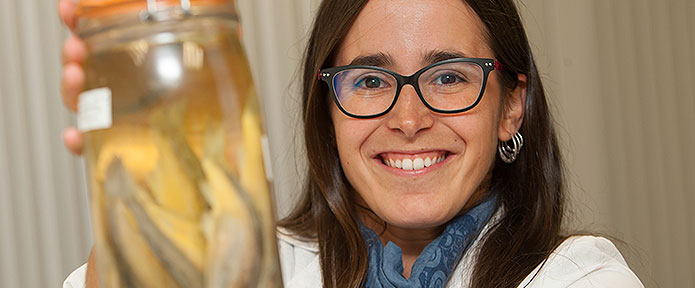"I would like to shed light on maximizing the use of Biodiversity's data ."
Nora Escribano, the first Spaniard to receive the Young Researchers Award, does research thanks to a scholarship funded by donations.

The Global Biodiversity Information Infrastructure (GBIF), a network of countries and international organizations that seeks to support scientific research , promote biological conservation and encourage sustainable development , has awarded the award international Young Investigator Award to Nora Escribano. She is a student of the University, she is doing her doctorate in the School of Sciences thanks to a scholarship of the association of Friends.
The Young Researchers Award, an award of 5.000 €, has as goal that the doctoral students prepare a article of data where the set of data is fully described and its publication in an open access journal.
Nora has developed her thesis from 1,776 samples of macroinvertebrates (invertebrates larger than 0.02 cm) obtained and analyzed by researcher Javier Oscoz. These samples are kept in the Zoology Museum (MZNA), which is part of the Natural Sciences Museum of the University.
What does your thesis consist of?
One of the objectives of my thesis is to explore how the informative value of biodiversity records degrades as they age. Records are the who, where and when a living thing was observed, captured or sampled. These data are the starting point for research, however, the "older" a record is, the more outdated the information it provides may be. Therefore, we must explore how to maximize the employment of this information to obtain reliable results.
Why did you decide to try this topic?
During my degree program I collaborated as a student intern in the department of Environmental Biology. And thanks to Carmen Escala, professor, and David Galicia, my current director of thesis , I found my passion in the study of small mammals. On the other hand, Arturo H. Ariño, also director of my thesis , initiated me in the world of massive analysis of data of biodiversity.
What do you want to achieve with the development of your work?
I would like my work to shed light on how to maximize the use of data for biodiversity. I also want to continue to increase the information about the small mammals of Navarra.
As a scholar, what would you say to the Friends of the University who have contributed to the funding of your scholarship?
Thank you very much for your support. Without your partnership, young people like me have been able to dedicate ourselves to what we are passionate about: the research. I feel fortunate and grateful for the opportunity given to me by the association of Friends of the University of Navarra. Know that your grain of sand counts, and that you are helping to train excellent researchers in a scenario where it is increasingly difficult to dedicate oneself to research . In my case, I have been able and continue to dedicate myself to what makes me happy.
Zoology Museum of the University of Navarra
The Museum of Zoology (MZNA) -integrated in the Science Museum of the University of Navarra- was founded in 1980 as archive of the zoological materials derived from the research and professor activity of department of Environmental Biology (previously department of Zoology and Ecology). MZNA stores several million specimens in its air-conditioned facilities and is open to researchers from all over the world, making loans and accepting deposits as well as managing and maintaining the Natural History Collections of the School of Sciences of the University of Navarra.
